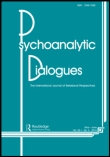
PSYCHOANALYTIC DIALOGUES
Scope & Guideline
Illuminating the Pathways of Psychoanalytic Research
Introduction
Aims and Scopes
- Interdisciplinary Psychoanalysis:
The journal promotes a dialogue between psychoanalysis and other disciplines, such as sociology, politics, and cultural studies, highlighting the relevance of psychoanalytic concepts in understanding complex social dynamics. - Focus on Trauma and Collective Experience:
A significant emphasis is placed on the exploration of trauma—both individual and collective—especially in relation to historical and sociopolitical contexts, including issues of race, migration, and communal suffering. - Intersubjectivity and Relational Dynamics:
The journal consistently addresses themes of intersubjectivity and relational dynamics in psychoanalytic practice, emphasizing the importance of the therapeutic relationship and the impact of social contexts on individual experiences. - Cultural Critique and Social Activism:
Psychoanalytic Dialogues encourages critical engagement with cultural phenomena, exploring how psychoanalytic theory can inform social activism and contribute to discussions on justice, identity, and belonging. - Innovative Psychoanalytic Practices:
The journal explores new and innovative approaches to psychoanalysis, including the integration of somatic experiences, autotheory, and other contemporary practices that challenge traditional psychoanalytic frameworks.
Trending and Emerging
- Racial Justice and Intersectionality:
There is a notable increase in discussions surrounding racial justice, intersectionality, and the experiences of marginalized communities, indicating a growing recognition of the importance of these issues within psychoanalysis. - Climate Crisis and Psychoanalysis:
Emerging themes related to climate change and ecological concerns are becoming integral to psychoanalytic discussions, exploring how environmental issues intersect with mental health and community resilience. - Collective Trauma and Healing:
The exploration of collective trauma, particularly in the context of global crises, is gaining prominence, highlighting the need for psychoanalysis to address communal healing and socio-political activism. - Psychedelic Research and Psychoanalysis:
Increased interest in the therapeutic potential of psychedelics and their integration into psychoanalytic practice reflects a broader trend towards innovative approaches in mental health treatment. - Gender and Sexuality in Psychoanalysis:
There is a rising focus on gender fluidity, LGBTQ+ issues, and the complexities of sexual identity, showcasing an evolving dialogue that challenges traditional psychoanalytic views.
Declining or Waning
- Traditional Psychoanalytic Frameworks:
There appears to be a waning interest in classical psychoanalytic theories and methodologies, as the focus shifts towards more contemporary and relational approaches that prioritize the lived experiences of individuals in their socio-cultural contexts. - Focus on Individual Pathology:
Discussions centered solely on individual psychological pathology are becoming less frequent, with a growing preference for collective experiences and social factors influencing mental health. - Static Interpretations of Identity:
Papers that focus on static or essentialist notions of identity are declining, as the journal increasingly embraces fluid and dynamic understandings of identity shaped by social and political contexts.
Similar Journals
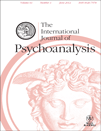
INTERNATIONAL JOURNAL OF PSYCHOANALYSIS
Exploring the Intersections of Mind and MethodINTERNATIONAL JOURNAL OF PSYCHOANALYSIS is a distinguished academic journal published by Taylor & Francis Ltd, focusing on the evolving field of psychoanalysis and its intersections with clinical psychology, psychiatry, and mental health. Established in 1945, the journal has maintained a commitment to advancing theoretical and practical knowledge in psychoanalytic research and practice. With a commendable impact factor and categorized in the Q2 quartile for Clinical Psychology, Medicine, and Psychiatry and Mental Health, it positions itself among the forefront of scholarly contributions in these disciplines. Featuring a diverse array of studies and articles, the journal provides a vital platform for researchers, professionals, and students to engage with contemporary psychoanalytic discourse. Although it does not offer open access, the journal remains a crucial resource for those seeking to deepen their understanding of psychological theories and practices. Its well-curated content encourages rigorous examination and dialogue on the intricacies of human behavior, making it a significant reference point for anyone invested in the mental well-being of individuals.
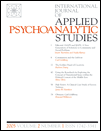
International Journal of Applied Psychoanalytic Studies
Advancing Knowledge at the Intersection of Psychoanalysis and PsychologyWelcome to the International Journal of Applied Psychoanalytic Studies, a pioneering publication in the field of psychoanalysis, published by the reputable WILEY. With ISSN 1742-3341 and E-ISSN 1556-9187, this journal serves as a vital resource for professionals, researchers, and students interested in the intersection of psychoanalytic theory and practical application. Established in 2009, this biannual journal aims to foster innovative research and provide a platform for critical discussions spanning various aspects of psychoanalysis within the psychological realm. Although currently categorized in the Q3 quartile of Psychology (miscellaneous) and ranked #158 in Scopus's general psychology category, the journal aspires to enhance its impact and reach by continuously improving the quality of published works. Access to this journal is available primarily through subscription, ensuring the highest standards of scientific and editorial rigor. Join us in exploring and advancing the frontiers of psychoanalytic knowledge and its implications for contemporary psychological practice.

GRUPPENPSYCHOTHERAPIE UND GRUPPENDYNAMIK
Cultivating Knowledge for Group Therapy ExcellenceGRUPPENPSYCHOTHERAPIE UND GRUPPENDYNAMIK is a pivotal journal in the field of group psychotherapy and dynamics, published by Vandenhoeck & Ruprecht GmbH & Co KG. With an ISSN of 0017-4947 and an E-ISSN of 2196-7989, this journal has been a significant resource for practitioners and researchers since its inception in 1974, covering invaluable insights and contemporary practices until 2018. While the journal currently does not offer open access, its comprehensive archives provide rich empirical studies and theoretical discussions that contribute to the advancement of psychological practices within group settings. The publication stands out for its meticulous approach in bridging theory with practical application, aimed at enhancing group therapeutic experiences, making it an essential read for professionals, students, and academics dedicated to advancing their understanding and practice in group psychotherapy.
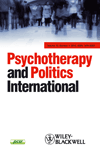
Psychotherapy and Politics International
Connecting Mental Health Perspectives with Global Political ContextsPsychotherapy and Politics International is a distinguished journal that explores the intricate interplay between therapeutic practices and political discourse. Based in Germany and published by its own dedicated organization, this journal provides a unique platform for interdisciplinary dialogue, catering to researchers, practitioners, and students interested in the multifaceted dimensions of psychotherapy within political contexts. Although it is not open access, its focus on innovative and critical analyses situates it favorably within the field, holding a Q3 category ranking in the Multidisciplinary field as of 2023. The journal, which has published works from 2013 to 2021, reflects a commitment to advancing the understanding of how psychological theories and practices inform and are influenced by socio-political factors. With an increasing relevance in today's global landscape, Psychotherapy and Politics International serves as a vital resource for those seeking to navigate the convergence of mental health and political dynamics.

Acta Literaria
Illuminating the Rich Tapestry of Literary StudiesActa Literaria is a distinguished journal published by the Universidad de Concepción, Facultad de Humanidades y Arte, focusing on the intricate domains of literature and literary theory. With an ISSN of 0717-6848, this Chilean journal has been a vital contributor to the scholarly discourse in its field since its inception in 2007. Although currently categorized in the Q4 quartile for the year 2023 and holding a Scopus rank of #860 out of 1106 in the Arts and Humanities section, Acta Literaria plays a crucial role in fostering dialogue and exploration among researchers, professionals, and students alike. The journal aims to facilitate the exchange of innovative ideas, critical analyses, and diverse perspectives on literature, making it an indispensable resource for anyone engaged in literary studies. While it does not offer open access, the journal's commitment to upholding academic rigor ensures that it remains a respected platform for scholarly publication.
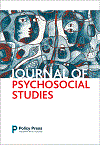
Journal of Psychosocial Studies
Connecting Scholars to the Heart of Psychosocial StudiesThe Journal of Psychosocial Studies, published by Bristol University Press & Policy Press, is a vital resource for scholars and practitioners interested in the intersections of psychology, sociology, and cultural studies. With its ISSN 1478-6737 and E-ISSN 1478-6737, the journal aims to foster a deeper understanding of complex psychosocial phenomena within a global context, reaching a diverse audience from its base in the United Kingdom. As an open access journal, it ensures widespread availability of its research findings, while also maintaining rigorous academic standards through its Scopus rankings—in the 70th percentile for Cultural Studies and a respectable 15th percentile in Social Psychology. Covering converged years from 2019 to 2024, the journal provides a unique platform for innovative research and discourse, making it an essential reference for researchers, professionals, and students dedicated to advancing knowledge in social sciences.

PSYCHOANALYTIC QUARTERLY
Innovating Psychoanalytic Theory for Modern MindsThe PSYCHOANALYTIC QUARTERLY, published by Taylor & Francis Inc, stands as a prominent scholarly journal in the domain of psychoanalysis and mental health. With a legacy dating back to 1945, this journal has continually evolved, showcasing a diverse range of critical research and theoretical discussions. It is highly regarded, holding a Q1 ranking in Arts and Humanities (miscellaneous) and a Q2 ranking in various psychological and medical fields as of 2023, indicating its significant impact within these disciplines. The PSYCHOANALYTIC QUARTERLY is not an open-access journal, making its contributions particularly coveted among researchers and practitioners who seek in-depth analyses and innovations in psychoanalytic theory and practice. By providing a platform for interdisciplinary dialogues, the journal aims to foster a deeper understanding of psychoanalytic concepts and their applications, thus appealing to a wide range of scholars, professionals, and students interested in advancing the field.
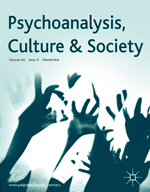
Psychoanalysis Culture & Society
Decoding the Influence of Psychoanalysis on Social DynamicsPsychoanalysis Culture & Society, published by Palgrave Macmillan Ltd, serves as an essential interdisciplinary journal that explores the rich interconnections between psychoanalytic theory, culture, and societal dynamics. With an ISSN of 1088-0763 and an E-ISSN of 1543-3390, this UK-based journal not only provides a platform for scholarly discourse but also aims to enhance our understanding of how psychoanalysis influences and is influenced by cultural and social factors. As of 2023, it holds notable ranks across various categories in Scopus, including a Q2 status in Cultural Studies and Q4 ranking in Applied Psychology and Social Psychology, indicating its growing impact and relevance in these fields. Although it currently does not offer open access options, its rich content appeals to a broad audience of researchers, professionals, and students dedicated to exploring the complexities of human behavior within cultural contexts. By contributing to the dialogue around psychoanalysis and its applications, this journal continues to advance knowledge and facilitate innovative research in the applied and social sciences.

Psychoanalysis Self and Context
Exploring the Depths of Mind and ContextPsychoanalysis Self and Context is a dynamic journal published by Taylor & Francis Inc that delves into the intricate realms of psychoanalysis, clinical psychology, and mental health. Established in 2017, this journal seeks to explore the profound connections between individual experiences and broader psychological frameworks, fostering a nuanced understanding of the self within various contexts. With an ISSN of 2472-0038 and an E-ISSN of 2472-0046, it is committed to scholarly excellence, as evidenced by its current Q3 rankings in both Clinical Psychology and Psychiatry and Mental Health for 2023. Despite its relatively short history, it has positioned itself as a noteworthy contribution within the field, ranked #237 in Clinical Psychology and #455 in Psychiatry and Mental Health by Scopus. The journal is crucial for researchers, practitioners, and students alike, offering valuable insights and rigorous discourse that contribute to the advancement of psychological science and therapeutic practices. With a comprehensive scope that aims to bridge theoretical concepts and practical applications, Psychoanalysis Self and Context serves as an indispensable resource for those dedicated to understanding the complexities of the human mind.

International Forum of Psychoanalysis
Pioneering Insights for Clinical ExcellenceInternational Forum of Psychoanalysis, published by Routledge Journals, Taylor & Francis Ltd in the United Kingdom, is a pivotal platform for scholarly discourse in the field of psychoanalysis. Since its inception in 1992, this journal has offered a unique intersection of theoretical and empirical perspectives, catering to researchers, clinicians, and students interested in advancing the understanding of psychoanalytic principles and their clinical applications. With an impact factor reflective of its specialized niche and ranked Q3 in Clinical Psychology and Q4 in Psychiatry and Mental Health, the journal plays a critical role in disseminating cutting-edge research that informs best practices in mental health. Although it does not currently offer open access, the International Forum of Psychoanalysis continues to be an essential resource for those seeking to deepen their knowledge of the psychoanalytic field, bridging contemporary theory with clinical practice as it converges through 2024 and beyond.